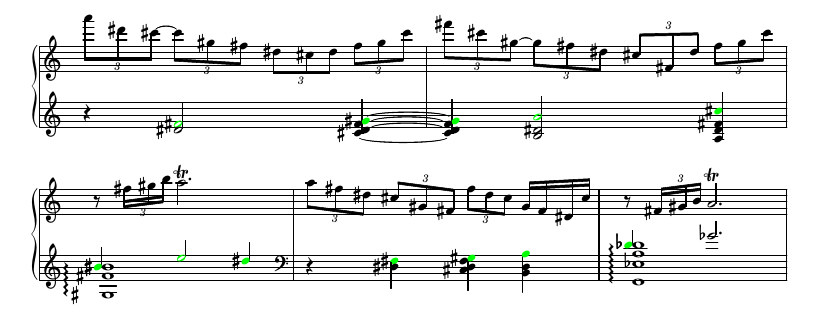Rachmaninoff Piano Concerto No. 1 - A Review @ r4
Rachmaninoff's 2nd1 and 3rd2 piano concertos get all the love, but what about his first? I've listened to it a few times but either it's not very memorable or I wasn't paying close enough attention. For my 2nd 2022 music project I thought it would be fun to listen to it more closely. Like it was my school assignment to do so.
Sometimes these things sound more fun in my head. But now I'm in too deep, so off we go.
1st Movement
Like most Rachmaninoff and/or late-Romantic pieces, there's a lot of chromatics. The main theme is pretty rich harmonically, which I've notated below.
Nothing truly crazy, but I thought the modulation progression from F♯m → G♯7 → C♯m → D♯7 and then moving backward to C#m by way of G♯7 (instead of the more natural G♯m) was neat. And then using the G♯ as a pedal tone around the Bm6 to eventually resolve to C#7 was also neat. It's very satisfying and natural. Kinda reminiscient of the third concerto (or vice versa, I guess) with a simple main theme with some meandering chromatics and then eventually resolving to V7 - i.
Another interesting thing I noticed in the first movement was during the cadenza. In true Rachmaninoff form, there are lots of notes and block chords, but this cadenza features a lot of modulations. Within some of these modulations are references to the main theme (as shown above, highlighted in green below):
However, I don't completely understand the reason for the oddly spelled and seemingly out of place F7 chord in the last bar. Obviously the D♭ enharmonic finishes the last note of the first measure of the main theme, but I don't even understand why Rachmaninoff put an F7 chord under what's clearly an arpeggiated F♯m6 run (ending with the trill on A).
The only thing I could think of is that a few bars later it changes keys to D♭, so maybe the F7 chord is setting up the (eventual) key change: F7 is the V of B♭ minor which is the relative minor of D♭... meh, seems a stretch to me.
- I like Yuja Wang's interpretation best
- Arcadi Volodos does a great ossia cadenza, and Yuja Wang does a great non-ossia cadenza


